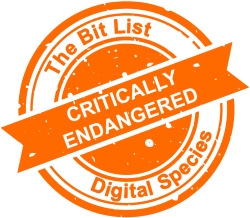Games with Online Play Components
 |
||
|
Video games with online components that have online elements for interactive aspects of play, in particular those with online multiplayer components. This does not exclude games that have both online multiplayer and offline single player components (e.g., Dark Souls has online multiplayer components but also has the ability for single player play in offline mode) but rather the focus on the entry is on the online components for interactive play and there is more potential to preserve the interaction. This excludes games that are no longer available legally. |
||
|
Digital Species: Gaming |
Trend in 2022:
|
Consensus Decision |
|
Added to List: 2019 (rescoped 2023) |
Trend in 2023:
|
Previously: Critically Endangered |
|
Imminence of Action Action is recommended within three years, detailed assessment in one year. |
Significance of Loss The loss of tools, data or services within this group would impact on a large group of people and sectors. |
Effort to Preserve | Inevitability It would require a major effort to prevent or reduce losses in this group, including the development of new preservation tools or techniques. |
|
Examples Dark Souls, Minecraft, Portal 2, Stardew Valley. |
||
|
‘Practically Extinct’ in the Presence of Aggravating Conditions Always online DRM; Controversies around IPR; lack of offline backup; changing business model of providers; limited recognition of value of game play; over dependence on goodwill of ad-hoc community; lack of preservation know-how at service providers; dependency on bespoke hardware or interfaces; Complex hardware dependencies or bespoke hardware. |
||
|
‘Endangered’ in the Presence of Good Practice Emulation pathway; source code; trusted repository; large user community; IPR supportive of preservation; strong documentation. |
||
|
2023 Review This entry, alongside the Games with Offline Play Components entry, was created from rescoping the previous Old or Non-current Video Games entry as part of the 2023 Bit List review. It was rescoped to highlight the differences in preserving online components as opposed to offline components in video games, specifically the dependency of servers. |
||
|
Additional Comments Whilst this entry focuses on games with online play components that are still accessible (any servers that have been shut down or discontinued would fall into the Shut Down or Discontinued Video Games entry), these games could potentially lose server support thus necessitating urgent action to preserve the online component whilst the server is still active. A recent example of this is the announcement in October 2023 of Nintendo discontinuing online services for Nintendo 3DS and Wii U software from early April 2024. Whilst the offline component will still be accessible, the game will have lost features and/or game modes that use online components thus changing the nature of the game. Case Studies or Examples:
See also:
|
||






























































































































